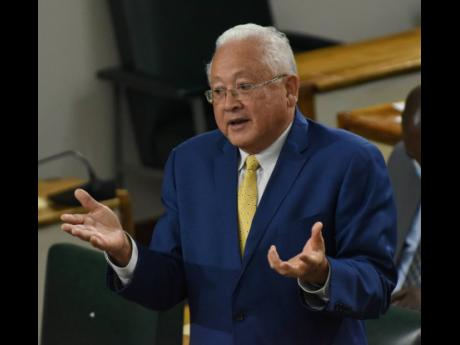Minister willing to contemplate 40-yr minimum sentence request for murder
WESTERN BUREAU:
Justice Minister Delroy Chuck says he would have no issue with taking into consideration a call from the Director of Public Prosecutions (DPP) Paula Llewellyn for 30 to 40 year’ imprisonment as the starting point for a life sentence for all murder convictions before eligibility for parole.
“There is no doubt that we need to put a mandatory minimum [term of imprisonment]. Bear in mind, the death penalty is still the penalty for murder, so in especially egregious cases, nothing is wrong with making 40 years the mandatory minimum, so I have no problem with that,” Chuck said in an interview on Thursday.
“I think that for persons who have engaged in gross acts of criminality such as murder, they deserve to be in prison, perhaps for life. In America and in many other countries, oftentimes the sentence is life imprisonment without parole, but what is happening with the minimum sentence is that it says you won’t even be considered for parole until after 30 or 40 years,” Chuck added.
Last week, Llewellyn said she would make a recommendation to the Ministry of Justice for an amendment to the Criminal Justice Administration Act, in order to facilitate the adjustment to the mandatory minimum prison term.
The announcement came after the Court of Appeal ruled to reduce convicted killer Quacie Hart’s prison sentence before eligibility for parole from 31 years to 20 years. Hart is serving a life sentence for the stabbing death of 14-year-old Jamaica College student Nicholas Francis during an altercation on a bus on October 26, 2016.
The Criminal Justice Administration Act, which was amended in 2015 and again in 2018, speaks to the issue of a court reducing the sentence of a defendant who pleads guilty to an offence, wherein the sentence may be reduced from what the court would have imposed if the defendant had been tried and convicted for the offence.
Commenting further on Thursday, Chuck said that Parliament will need to discuss the possible contrast between the mandatory minimum requirement and the plea-bargaining process, where a defendant may get a significantly reduced sentence if he or she agrees to plead guilty in accordance with the prosecution’s recommendations.
“That is something we will discuss and Parliament will make a decision, where if persons plead guilty, they could use the plea-bargaining negotiation and the mandatory minimum may not apply. Personally, I think the plea bargaining could be utilised more, especially in appropriate cases, but that does not mean the mandatory minimum won’t apply,” said Chuck.
“In really egregious cases, even if the person is pleading guilty, the DPP may still insist that the mandatory minimum be imposed. But to the extent that it is a case that has mitigating factors, and it is not as gross as in the vast majority of murder cases, then the possibility exists that the DPP, using plea bargaining, could consider a lesser penalty than the mandatory minimum,” Chuck outlined.
He also noted that the imposition of the mandatory minimum sentence on convicted criminals is a good reason why community partnerships should be forged as a way to deter criminal elements.
“We will have to appeal to communities to not only assist the police and the Government in exposing the gangsters, but they must protect their communities because it is these gangsters who are keeping these communities under siege, and it is important that [residents] play a part in the prevention of the gang violence,” said Chuck.

